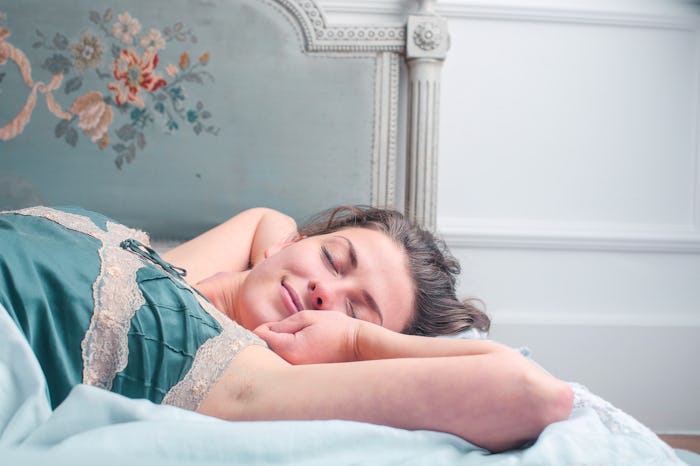Life

Your Height & 3 Other Ways Your Body Is Different In The Morning Vs. At Night
When you look in the mirror each morning, the person looking back at you is a little different than the one who went to bed a few hours ago. It's easy to forget, but people's bodies are always changing in some pretty fascinating ways, even while sleeping. In fact, there are plenty of physical ways your body is different in the morning versus the evening. Everything from your spine to your salivary glands are making changes and adjustments while you snooze.
Although it may be easy to picture your body as a static thing, it's always in motion. Blood is flowing, air is entering the lungs, and your body temperature is adjusting all the time. (It's a good thing so many of the body's functions are automatic, right? It would be exhausting if people had to consciously think about all this stuff.) Although in many cases these changes are very minor, sometimes there's a noticeable difference in your morning body and your nighttime body. Height, foot size, and even salivary production can make a noticeable difference, and you can even measure these things for yourself before and after bed. Here are the ways that your body may not be the same when you wake up from when you go to sleep.
1Height Is Greater In Morning
People tend to be shorter in the evenings. "The discs in your spine get compressed from being upright all day," said Todd Sinett, DC, a New York City-based chiropractor and author of The Truth About Back Pain in Everyday Health. The difference can be as much as a centimeter. If the idea is still boggling your mind, then Business Insider has a great video that illustrates why people are shorter at night.
2Body Temp Is Lower In Morning
Your body's temperature also changes a bit throughout the course of a day. "The 98.6 degrees you likely think of as 'normal' is actually just the starting point for your body’s internal temperature," as explained in The National Sleep Foundation. "From there, it fluctuates by a couple degrees over the course of the day—rising about one to two degrees from early morning until late afternoon, and then reversing until it hits its lowest point a couple hours before you wake up in the morning." In general, falling temperatures tend to make you drowsy, whereas warming temps leave you more energized, as further explained in The National Sleep Foundation.
3Feet Are Smaller In The Morning
Even your feet can change a bit over the course of a day. "Wait until the afternoon to shop for shoes — your feet naturally expand with use during the day and may swell in hot weather," according to Harvard Health Publishing. This is why those shoes that feel fine in the morning might seem a bit tight by the end of the day.
4Saliva Production Is Reduced At Night
There's a real reason you tend to wake up with a dry mouth. "The amount of saliva produced is greatest during the waking hours of the day and diminishes dramatically during sleep and may represent another process in the human body that displays a circadian rhythmicity," according to a study in Sleep Medicine Reviews. Just reading that makes you want to guzzle a glass of water, right?
The body undergoes some fascinating changes during the hours when you're asleep, and while they're mostly completely normal and subtle, you shouldn't hesitate to have a conversation with your healthcare provider if you feel like your body is drastically different between the morning and evening.